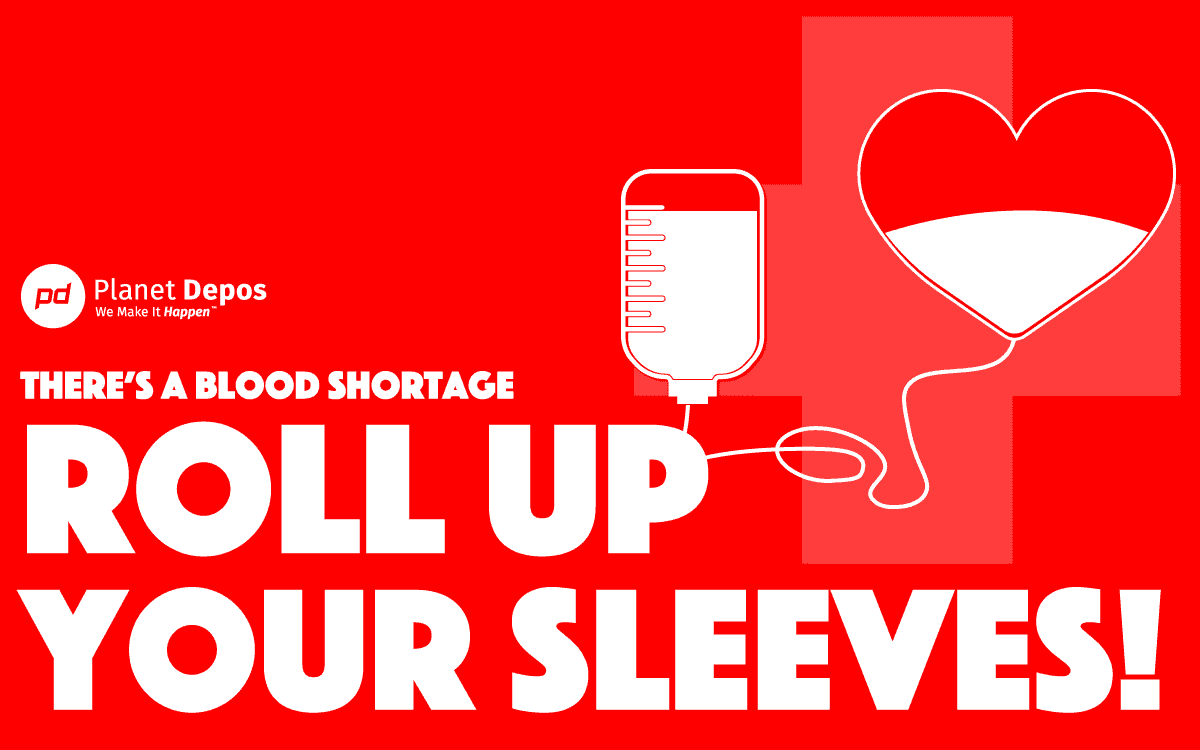At the end of 2020, Planet Depos highlighted the work the American Red Cross was doing to help in the Covid-19 battle, as well as in general. The American Red Cross continues to supply life-saving blood to hospitals, surgical centers, and more, all throughout the U.S., but the supplies are dwindling. There is currently a critical blood shortage in the U.S. and donors are desperately needed to ramp up the supply. Summer shortages are not unheard of, but this shortage has been particularly severe. Many blood centers have no more than one day’s supply of blood on their shelves at the present time. The demand for blood is also increasing as hospitals have resumed surgeries which were postponed during the height of the pandemic. Here is the good news – all that is needed to address the shortage is healthy, generous folks to roll up their sleeves.
Blood is essential. Blood is used in treating patients with traumatic injuries – think car accidents, burns, and other common incidents with catastrophic effects. Blood is often used for new mothers after childbirth. My best friend, for example, required several transfusions after the birth of her oldest child and again after surgery late last year. Cancer patients often need platelets following chemo. The list goes on and on. As you can imagine, hospitals and cancer centers need to always have a healthy blood supply available, for all blood types.
What’s your type? There are eight different blood types – A+, A-, B+, B-, AB+, AB-, O+ and O-. It’s pretty cool to see the impact your blood type has. For example, I am A-, and my blood type comprises 6% of the population. The most impactful donations I can make are double red blood cells or whole blood. People with my blood type can receive only A- or O- blood. But what is really neat is that people with A+/-, AB+/- can receive my blood cells, and people with A+/- or O+/- blood can receive my platelets or plasma. Want to see the kind of impact your blood donation can have? Check it out at Target your Type. The information just may motivate you to schedule your recurring appointment.
Prepare for your appointment. To ensure you make a complete, successful donation, there are some preliminaries to cover. This list is not exhaustive, but you can find more information online.
- Check with your donation site regarding medications you take, as some medications may affect your eligibility.
- Make an appointment.
- In the days leading up to your appointment, eat iron-rich foods like spinach, fish, eggs, red meat, etc., to maintain good iron levels.
- Get a good night’s sleep the night before your donation.
- Hydrate, hydrate, hydrate – drink an extra 16 oz. of water before you donate. Avoid caffeine before your appointment.
- Eat a full, healthy meal before you donate (within 2 hours is ideal) – avoid fatty foods.
- Wear a shirt with sleeves you can easily roll up or go sleeveless!
After your donation, you should drink plenty of extra fluids throughout the day, and avoid strenuous physical activity, heavy lifting, and extreme heat. Keep your bandage on for a minimum of four hours after your donation. Enjoy more iron-rich foods to help replace iron lost with your donation.
If you are not eligible to be a donor, there are other ways you can help. You don’t have to open your veins! You can spread the word, volunteer to assist at or help organize a blood drive or donate in another way. Open your wallet! Monetary donations are a tremendous help, or you could even donate crates of soda or juice, or cookies.
Someone in the United States needs blood every two seconds. There is no substitute for human blood. Donated red blood cells have a shelf life of 42 days, making regular blood donation necessary to keep life-saving blood available to patients. The American Association of Blood Banks has more information on the importance and use of blood donations, and ways you can help replenish our blood banks.
